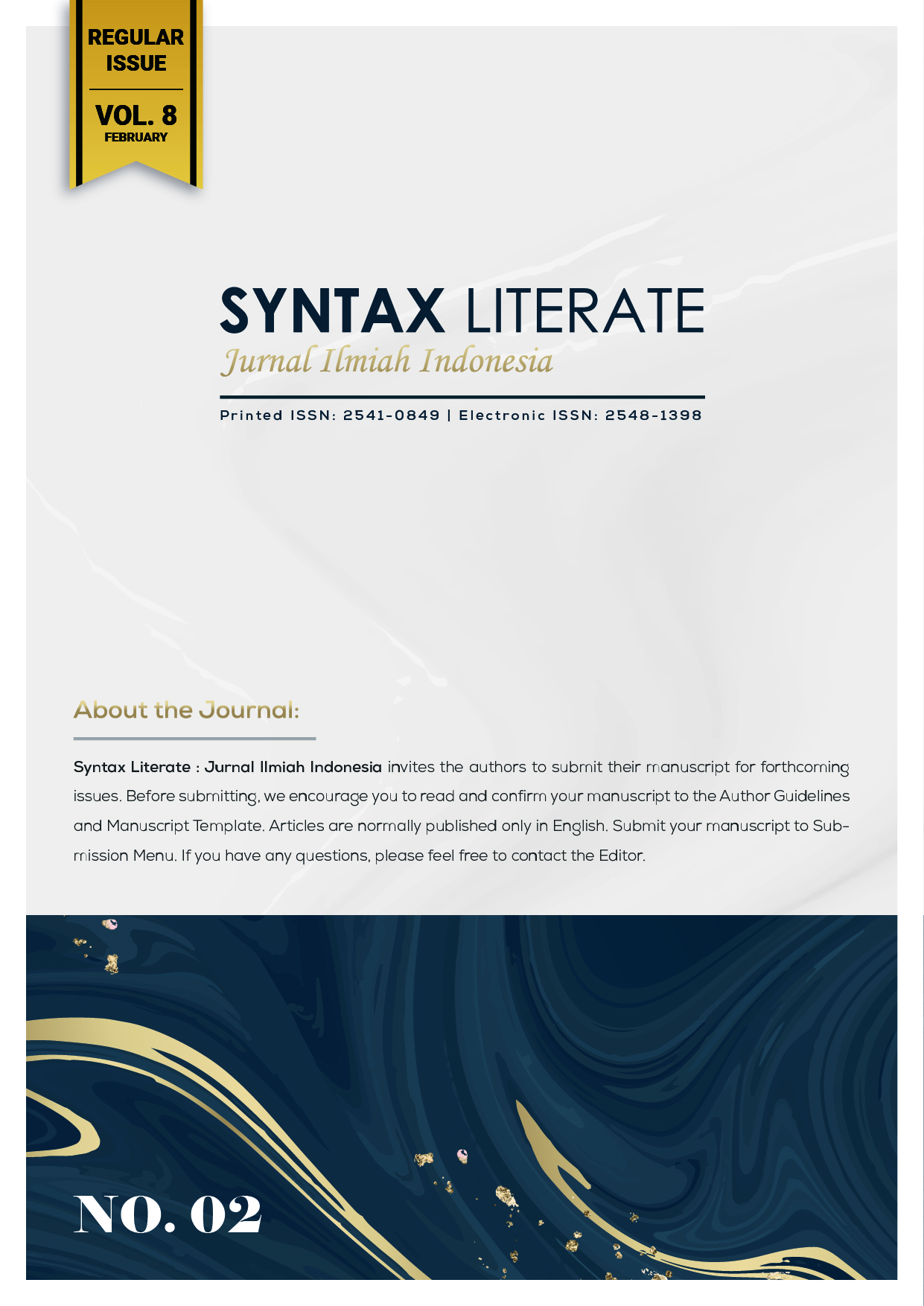Character Education Through The Development of Spiritual Intelligence at SMA Plus YPHB
Abstract
Until now, education in schools is still more focused on efforts to develop students' intellectual intelligence, while efforts to develop other intelligences such as spiritual intelligence are still not given enough attention or have not been implemented seriously. Even though the development of spiritual intelligence is very closely related to student character education efforts. As a result, the output of character education is not as expected and has an impact on the decline of the nation's morale. On that basis, this study aims to determine the implementation of character education through the development of spiritual intelligence at SMA Plus YPHB Bogor City. This study uses a qualitative approach with analytic descriptive method. Data collection through interview techniques, observation, and documentation studies, involving data sources, namely; principals, vice principals, teachers and students at SMA Plus YPHB Bogor, and triangulation was used to test the validity of the data. The results of the study show that the implementation of character education at SMA Plus YPHB Bogor City, has a unique model, including establishing a full day school policy, an Active, Creative, Effective and Fun based learning approach, the Quantum Teaching method, and establishing a distinctive curriculum policy based on values -religious values, especially Islam.
Downloads
References
Apriana, D., Kristiawan, M., & Wardiah, D. (2019). Headmaster’s competency in preparing vocational school students for entrepreneurship. International Journal of Scientific & Technology Research, 8(8), 1316–1330.
Bajari, A., & Kuswarno, E. (2020). Violent language in the environment of street children singer-beggars. Heliyon, 6(8), e04664. https://doi.org/10.1016/j.heliyon.2020.e04664
Espelage, D., Anderman, E. M., Brown, V. E., Jones, A., Lane, K. L., McMahon, S. D., Reddy, L. A., & Reynolds, C. R. (2013). Understanding and preventing violence directed against teachers: RecomSmendations for a national research, practice, and policy agenda. American Psychologist, 68(2), 75. https://doi.org/10.1037/a0031307
Hanefar, S. B., Sa’ari, C. Z., & Siraj, S. (2016). A synthesis of spiritual intelligence themes from Islamic and Western philosophical perspectives. Journal of Religion and Health, 55, 2069–2085. https://doi.org/10.1007/s10943-016-0226-7
Ismail, I. (2016). Character education based on religious values: an Islamic perspective. Ta’dib: Jurnal Pendidikan Islam, 21(1), 41–58. https://doi.org/10.19109/td.v21i1.744
Izzati, U. A., Bachri, B. S., Sahid, M., & Indriani, D. E. (2019). Character education: Gender differences in moral knowing, moral feeling, and moral action in elementary schools in Indonesia. Journal for the Education of Gifted Young Scientists, 7(3), 547–556. https://doi.org/10.17478/jegys.597765
Jian, C., Klimke, M., Kirasirova, M., Nolan, M., Young, M., & Waley-Cohen, J. (2018). The Routledge Handbook of the global sixties. Routledge Abingdon.
Munthoha, P. Z., & Wekke, I. S. (2017). Pendidikan akhlak remaja bagi keluarga kelas menengah perkotaan. Cendekia: Jurnal Kependidikan Dan Kemasyarakatan, 15(2), 241–263. https://doi.org/10.21154/cendekia.v15i2.1153
Pea, R. D. (2018). The social and technological dimensions of scaffolding and related theoretical concepts for learning, education, and human activity. In The journal of the learning sciences (pp. 423–451). Psychology Press.
Pradana, D. A., Mahfud, M., Hermawan, C., & Susanti, H. D. (2020). Nasionalism: Character Education Orientation in Learning Development. Budapest International Research and Critics Institute-Journal (BIRCI-Journal) Volume, 3, 4026–4034.
Rokhimawan, M. A., Istiningsih, & Sukiman. (2020). The concept of elective-coordinative curriculum model in level of bachelor degree at department of education teacher Madrasah Ibtidaiyah in Indonesia. International Journal of Scientific and Technology Research, 9(1), 2011–2017.
Salimah, M. (2017). A techno-religious framework to scaffold spiritual intelligence among students/Salimah Mokhtar. University of Malaya.
Schmidt, H. G., Rotgans, J. I., & Yew, E. H. J. (2011). The process of problemâ€based learning: what works and why. Medical Education, 45(8)
, 792–806. https://doi.org/10.1111/j.1365-2923.2011.04035.x
Suhifatullah, M. I., Sutarman, S., & Thoyib, M. (2021). Character education strategies in improving students’ spiritual intelligence. International Research Journal of Management, IT and Social Sciences, 8(2), 155–162. https://doi.org/10.21744/irjmis.v8n2.1350
Syamsurrijal, A. (2021). Considering The Implementation of Children’s Character Education Inculcation in Indonesia and Japan. PEDIR: Journal of Elementary Education, 1(2), 40–51. https://doi.org/10.47750/pegegog.12.03.25
Copyright (c) 2023 Mastur Thoyib Kesi

This work is licensed under a Creative Commons Attribution-ShareAlike 4.0 International License.











